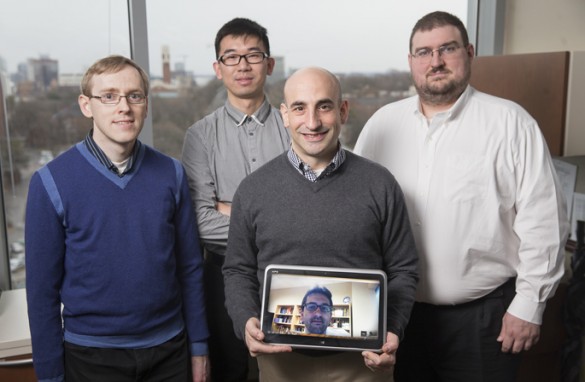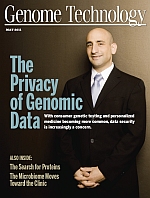A quick summary of notable news from the HIPLab (in progress).
-
March 2017:
- We presented two papers at the AAAI Spring Symposium on AI for Social Good in March 2017! Eugene Vorobeychik presented "Sanitizing Large-Scale Medical Records Before Publishing", while Zhiyu Wan presented "Game Theory Can Expand Access to Genomic Data While Promoting Privacy".
- A great media piece on our research on game theory and genomic privacy just came out. Read all about it!
- We won Track 1 (Practcal Protection of Genomic Data Sharing Through Beacon Services) of the 2016 iDASH Privacy and Security Competition. Congratulations to Zhiyu Wan for leading the development of the solution! Learn more about it in this news story.
- Our research grant on risk management in genomics and identifiability was renewed for four years by the National Human Genome Research Institute at the National Institutes of Health. We will mainly be focusing on game theoretic models for risk assessment and mitigation.
- We received funding from the National Human Genome Research Institute at the National Institutes of Health to establish a new Center of Excellence in Ethical, Social, and Legal Impliations Research (CEER), called the Center for Genetic Privacy and Identity in Community Settings, or GetPreCiSe.
- We received funding from the NIH to support the pilot project of the US Precision Medicine Initiative.
- Congratulations to Wen Zhang for successfully defending his doctoral dissertation, "Learning from Access Logs to Mitigate Insider Threats", as well as his new job as a Data Scientist at American Express!
- We recently received a 2-year EAGER award from the National Science Foundation (with Co-PI's Daniel Fabbri and Laurie Novak) for Managing Information Risk and Breach Discovery.
- Weijie Yu successfully defended his master's thesis in computer science, entitled "A Model-Based Environment for Garbled Circuits"!
-
Our paper, "A Game Theoretic Framework for Analyzing Re-identification Risks," was published the journal PLoS One. This is the first paper to model the problem of re-identification from a two-player game perspective. It shows that there are ways to set up de-identification schemas that deter rational adversaries from attempting to compromise identities while still sharing substantial quantities of data for research purposes. Further information can be found in this news story.

- Our paper, "SOEMPI: A Secure Open Enterprise Master Patient Index Software Toolkit for Private Record Linkage", won the Homer Warner Award (Best Paper) at the 2014 American Medical Informatics Association Annual Symposium!
- Wei Xie successfully defended his master's thesis in computer science, entitled "Protecting Participant Privacy in Genotype-Phenotype Association Meta-analysis"!
- As the lab branches out beyond privacy and into health information analytics, we were awarded a four-year grant from the National Science Foundation for High-throughput Phenotyping on Electronic Health Records using Multi-Tensor Factorization.
- Lina Sulieman successfully defended her master's thesis in biomedical informatics, entitled "A Process Modeling Strategy to Learn Ischemic Stroke Treatment Patterns from Electronic Medical Records"!
- We were featured in Carl Zimmer's story in Genome magazine on electronic medical records and genomics data sharing.
- Our lab is affiliated with two new Clinical Data Research Network (CDRN) grants from the Patient-Centered Outcomes Research Institute: 1) the Mid-South Clinical Data Research Network and 2) the Chicago Area Patient-Centered Outcomes Research Network
- Our paper "Evolving Role Definitions Through Permission Invocation Patterns," received honorable mention for the best paper award at the 18th ACM Symposium on Access Control Methodologies and Technologies.
- Our paper "Detecting Anomalous Insiders in Collaborative Information Systems," was recently named by ACM Computing Review as one of the top articles in computer science of 2012.
- We were awarded a 4-year grant from the National Human Genome Research Institute to develop "A Risk Management Framework for Identifiability in Genomics Research". This is a collaborative project with Ellen Wright Clayton and Murat Kantarciolgu (at the University of Texas at Dallas).
- We are a subcontract for David Carrell (at the Group Health Research Institute) on a 3-year grant from the National Library of Medicine to develop "Scalable and Robust Clinical Text De-identification Tools".
- Janos Mathe (lab affiliate) successfully defended his doctoral dissertation, "The Precise Construction of Patient Protocols: Modeling, Simulation, and Analysis of Computer Interpretable Guidelines"!
- Brad Malin (lab director) presented testimony on governance models for the collection, use, and dissemination of community health data before the Subcommittee on Privacy, Confidentiality, & Security of the National Committee for Vital and Health Statistics. This testimony was delivered on behalf of the Electronic Medical Records and Genomics Network
- Elizabeth Ashley Durham successfully defended her doctoral dissertation, "A Framework for Accurate, Efficient Private Record Linkage"!
- Brad Malin, was elected to fellowship in the American College of Medical Informatics (ACMI).
- Acar Tamersoy successfully defended his master's thesis, "Anonymization of Longitudinal Electronic Medical Records for Clinical Research".
- Our paper, "Leveraging Social Networks to Detect Anomalous Insider Actions in Collaborative Environments," was honored as a top paper of the IEEE Intelligence and Security Informatics Conference. An extended version will appear in the journal Security Informatics as "Specializing Network Analysis to Detect Anomalous Insider Actions".
- We had two extended abstracts accepted to the 2nd USENIX Workshop on Health Security and Privacy (HealthSec'11):
- Role Prediction Using Electronic Medical Record System Audits - authored by Wen Zhang, Carl Gunter, David Liebovitz, Jian Tian, and Brad Malin
- Context-Aware Anomaly Detection for Electronic Medical Record Systems - authored by Xiaowei Li, Yuan Xue, You Chen, and Brad Malin
- Brad Malin delivered a presentation entitled, "Technologies to Enable Privacy in Biomedical Databanks", before the National Library of Medicine Board of Regents.
- Elizabeth Ashley Durham, a doctoral student in the lab, won the Student Paper Competition at the 2010 American Medical Informatics Annual Symposium for her paper, "Private Medical Record Linkage with Approximate Matching".
- Brad Malin was awarded the Presidential Early Career Award for Scientists and Engineers (PECASE): White House, National Human Genome Research Institute, National Library of Medicine, Vanderbilt, Computing Community Consortium
- Our PNAS paper on anonymization of electronic medical records for genomic research generated a flurry of media buzz: ComputerWeekly, GenomeWeb, Nature News, Science News, Scientific American, Technology Review, The Register, Wired, ZDNet
- ArsTechnica reported on our participation in a panel on biobanking and privacy at the 2010 AAAS Annual Symposium.
- GenomeWeb wrote this story about our NLM grant on privacy technologies for data sharing and integration in biomedical databanks.
- Our paper, "Do Clinical Profiles Constitute Privacy Risks for Research Participants?" received the Distinguished Paper Award at the 2009 American Medical Informatics Annual Symposium. It was subsequently published in an extended form in the Journal of the American Medical Informatics Association as "The Disclosure of Diagnosis Codes can Breach Research Participants' Privacy".
- Department of Biomedical Informatics, Vanderbilt University
- Department of Electrical Engineering and Computer Science, Vanderbilt University
- Department of Biostatistics, Vanderbilt University
- Health Data Science Center, Vanderbilt University
- Genetic Privacy and Identity in Community Settings Center, Vanderbilt University
- Electronic Medical Records and Genomics Network, NIH sponsored
- The Mid-South Clinical Data Research Network, PCORI sponsored
January 2017:
November 2016:
September 2016:
April 2016
February 2016
December 2015
October 2015
July 2015
April 2015
November 2014
August 2014
July 2014
April 2014
January 2014
June 2013
May 2013
September 2012
August 2012
April 2012
March 2012
October 2011
June 2011
July 2011
May 2011

|
Brad Malin was featured in Genome Technology magazine's cover story on privacy. |
February 2011
November 2010
April 2010
February 2010
December 2009
November 2009
Related Links